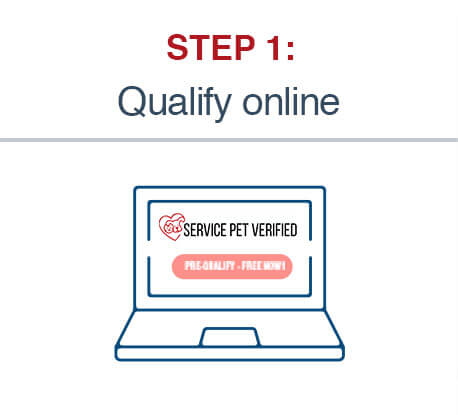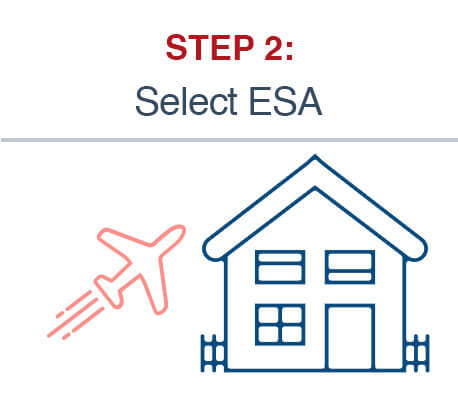
Emotional Support Animal (ESA) Laws
Emotional support animals (ESAs) provide more than companionship—they play an essential role in helping people navigate daily emotional or psychological challenges. ESA laws are in place to protect the people who rely on that support.
Unlike service animal regulations, which cover access to public places, ESA laws focus primarily on housing. If you’ve been approved for an emotional support animal by a licensed practitioner, housing providers are required by law to offer reasonable accommodations in most cases, even if there’s a no-pet policy in place.
ESA law doesn’t grant unlimited access, but it does offer meaningful protections that can help you and your cat or dog stay together, especially in the place that matters most: home.
What Is an Emotional Support Animal?
An Emotional Support Animal (ESA) is a dog or cat that provides comfort and emotional stability. Unlike service animals, ESAs don’t need special training—but they do require approval from a licensed practitioner to qualify under ESA laws.
Support Pets offers ESA documentation only for dogs or cats, as they’re most commonly recognized under housing protections and more likely to be accepted by landlords.

How ESA Laws Differ from Service Animal Laws
It’s easy to confuse emotional support animals with service animals, but the laws that protect them—and the roles they serve—are not the same.
Service animals are trained to perform specific tasks for individuals with physical or psychiatric disabilities. These animals are protected under the Americans with Disabilities Act (ADA) and are legally allowed in public places like restaurants, airplanes, and stores.
Emotional support animals, on the other hand, do not require training and aren’t granted the same public access. ESA laws are focused on housing and are protected under the Fair Housing Act (FHA). If you’ve been approved for an ESA, your housing provider must make reasonable accommodations, whether or not the property typically allows pets.
Understanding this distinction is essential. While both animals offer meaningful support, their legal rights and boundaries are different. That’s why the right documentation matters—and why ESA letters from licensed professionals are required to access these housing protections.
Where ESA Laws Apply (and Where They Don’t)
ESA laws offer important protections, but they don’t apply everywhere. Knowing where your emotional support animal is legally recognized can help you avoid misunderstandings and prepare with confidence.
Where ESA Laws Apply:
- Housing: Under the Fair Housing Act (FHA), landlords must make reasonable accommodations for individuals approved for an ESA, even in buildings with no-pet policies.
- Off-campus housing: Rental units not owned or operated by educational institutions typically fall under FHA guidelines and must consider ESA documentation.
Where ESA Laws Do Not Apply:
- Air travel: Airlines are no longer required to accommodate emotional support animals. Only trained service animals are guaranteed flight access.
- Public spaces: Restaurants, retail stores, and other public venues are not obligated to allow ESAs.
- Hotels: Hotels are treated like private businesses and may set their own pet policies. ESA laws do not require them to accommodate your animal.
Although your cat or dog may provide daily emotional support, federal ESA law limits legal recognition to specific settings, primarily housing. That’s why having a valid ESA letter is so important when navigating rentals and off-campus housing.
Federal ESA Housing Laws (FHA Protections)
The most important emotional support animal laws fall under the Fair Housing Act (FHA). This federal law prohibits housing discrimination and requires landlords to make reasonable accommodations for individuals with a verified emotional support animal.
If you’ve been approved for an ESA, here’s what the FHA protects you from:
- No-pet policies: Landlords cannot deny housing solely because of your ESA.
- Pet fees: You cannot be charged additional pet rent or deposits for a valid emotional support cat or dog.
- Breed or size restrictions: ESA protections override common breed bans, as long as your animal is manageable in your living environment.
To qualify for these protections, you must present a valid ESA letter from a licensed practitioner. This document verifies that you have an emotional or psychological need for a support animal, and that your cat or dog plays a role in your well-being.
While landlords can request to see your ESA documentation, they are not allowed to ask for details about your diagnosis or medical history. Your privacy matters—and so do your rights.
Landlord Rights vs. Tenant ESA Rights
Emotional support animal laws are designed to create balance, respecting your rights as a tenant while also allowing landlords to set reasonable boundaries. Here’s what both sides need to know:
As a tenant with an ESA letter, you have the right to:
- Live with your emotional support cat or dog in housing that typically prohibits pets
- Avoid pet fees, deposits, breed or weight-related restrictions
- Request reasonable accommodation without being required to disclose personal medical details
Landlords also have the right to:
- Ask for a valid ESA letter from a licensed practitioner
- Deny your ESA if it would cause significant financial or administrative hardship
- Deny approval if your ESA is aggressive, disruptive, or poses a health or safety risk
These laws protect emotional support animals and their owners, but they also require mutual understanding. The best approach is honest communication backed by proper documentation.

Your Responsibilities as an ESA Owner
Having an emotional support animal can be life-changing. Your cat or dog may help you feel grounded, less anxious, or simply not so alone. But with that comfort comes a shared responsibility—one that honors both your needs and the space you live in.
Being an ESA owner means:
- Keeping your cat or dog under control. They don’t need special training, but they should be well-behaved and safe around others.
- Respecting your surroundings. You’re responsible for any damage your pet may cause and for keeping shared spaces clean.
- Caring for their well-being. Providing food, affection, routine care, and a healthy environment shows your animal the same support they give you.
- Following local laws. ESA protections apply to housing, but basic animal ordinances—like leash rules and clean-up requirements—still apply.
This bond between you and your ESA is personal, and the law helps protect it. But the trust goes both ways. When you treat your ESA’s presence as both a right and a responsibility, you help ensure these important protections remain available to others who truly need them.
Can Emotional Support Animal Laws Vary by State?
While emotional support animal laws are primarily governed by federal protections—especially the Fair Housing Act—how those laws are interpreted or enforced can vary slightly by state.
Some states offer additional housing protections, while others follow only the baseline federal guidelines. Local laws may also influence how ESA documentation is reviewed or how complaints are handled if your rights are denied.
In general, federal ESA laws apply across the U.S., but always check your state’s housing policies or consult a licensed professional if you’re unsure about your specific situation.
*Support Pets provides ESA documentation through licensed practitioners. Dogs and cats only. Substantial limitations apply. Not available in California, Colorado, Louisiana, or Arkansas.

What to Do If Your ESA Rights Are Denied
Being told “no” when you’re just trying to keep your emotional support cat or dog by your side can feel frustrating—or even defeating. But you do have options.
If a landlord denies your ESA rights after you’ve presented a valid ESA letter:
- Ask for clarification. In many cases, misunderstandings can be resolved by calmly explaining the Fair Housing Act and your rights.
- Provide documentation. Make sure your ESA letter includes all required details: your licensed practitioner’s info, the date, and a clear explanation of your need.
- Document everything. Save emails, texts, or notes from your conversation. This can help if you need to take your concern further.
- File a complaint. You can report discrimination to the U.S. Department of Housing and Urban Development (HUD) through their online complaint form.
It’s your right to feel safe and supported in your own home, and your ESA letter helps make that possible. If you’re unsure how to move forward, Support Pets is here to guide you with clarity, compassion, and care.
*Support Pets provides ESA documentation through licensed practitioners. Cats and dogs only. Substantial limitations apply. Not available in California, Colorado, Louisiana, or Arkansas.
Frequently Asked Questions
Emotional support animal laws protect people with ESAs—typically in housing—ensuring their right to live with their support cat or dog even in no-pet rentals.
No. ESA laws apply to housing only, while service animal laws cover public access. ESAs don’t have the same rights in public spaces as service animals.
ESA laws primarily apply to housing under the Fair Housing Act. They do not apply to hotels, restaurants, or air travel.
ESA laws require landlords to make reasonable accommodations, waive pet fees, and allow emotional support cats or dogs—even in no-pet buildings.
While ESA laws are governed federally, some states may offer additional guidance. Always check local regulations or consult a licensed practitioner.
You need a valid ESA letter from a licensed practitioner that states your need for an emotional support animal. Registrations or ID cards are not legally required.
Yes, in certain cases, like if the animal poses a safety risk or creates major financial hardship. Otherwise, landlords must accommodate valid ESA requests.
No. ESA laws do not apply to hotels, which can set their own pet policies. Call ahead to ask if your ESA will be allowed.
No. Emotional support animals are not guaranteed access to public places like service animals. ESA laws apply only to housing.
Start by getting a valid ESA letter from a trusted provider like Support Pets. This documentation is key to securing housing protections under the law.

Ready to Protect Your ESA Rights?
You and your emotional support cat or dog share something powerful, and you deserve the peace of mind that comes with being protected by law.
At Support Pets, we make it simple to get the valid ESA documentation you need to secure housing rights and keep your support animal by your side. No confusing forms, no stressful appointments—just a trusted process built around your well-being.
*Support Pets provides ESA documentation through licensed practitioners. Dogs and cats only. Substantial limitations apply. Not available in California, Colorado, Louisiana, or Arkansas.
GET AN ESA LETTER IN 3 EASY STEPS

Use our quick and easy Free Online Pre-Qualifying Tool by clicking here

Choose an ESA letter and checkout to place an order

Fill out a questionnaire for the doctor. They will email your approved ESA.


